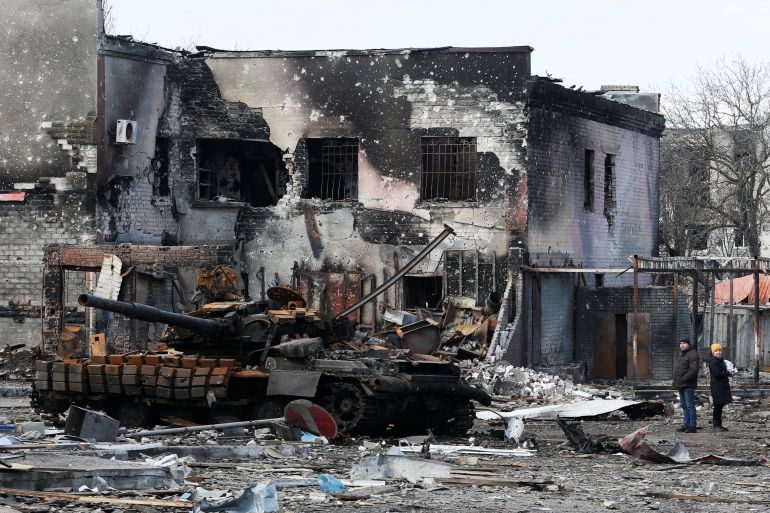Russia-Ukraine peace talks ‘sounding more realistic’: Zelenskyy
Kyiv sees room for compromise as Russian and Ukrainian delegations prepare for a new round of talks on Wednesday.

Ukraine’s President Volodymyr Zelenskyy has said peace talks with Russia were beginning to sound “more realistic” but that more time was needed to ensure the outcome of the negotiations were in Kyiv’s interests.
Zelenskyy’s comments early on Wednesday came as Russia’s invasion of Ukraine neared the three-week mark and Russian forces continued their bombardment of Ukrainian cities, including the capital, Kyiv, and the southern port city of Mariupol.
Keep reading
list of 4 itemsShould NATO impose a no-fly zone over Ukraine?
Biden to attend NATO, EU summits in Brussels to discuss Ukraine
How Russia’s tactics are evolving in Ukraine
Negotiators from the two countries have been meeting via video link since Monday, with the Ukrainian delegation pressing for a ceasefire, troop withdrawals and security guarantees.
Russia is yet to capture any of Ukraine’s 10 biggest cities, and officials in Kyiv have raised hopes the war could end sooner than expected, possibly by May. They say Moscow may be coming to terms with its failure to impose a new government by force and is running out of fresh troops.
“The meetings continue, and, I am informed, the positions during the negotiations already sound more realistic,” Zelenskyy said in his nightly video address.
“But time is still needed for the decisions to be in the interests of Ukraine.”
The two sides are expected to speak again on Wednesday.
Mykhailo Podolyak, an adviser to Zelenskyy and member of the Ukrainian delegation, has described the negotiations as “very difficult and viscous”.
In a Twitter post after Tuesday’s talks, Podolyak said there were “fundamental contradictions” between the two sides, but said “there is certainly room for compromise”.
We'll continue tomorrow. A very difficult and viscous negotiation process. There are fundamental contradictions. But there is certainly room for compromise. During the break, work in subgroups will be continued…
— Михайло Подоляк (@Podolyak_M) March 15, 2022
Kremlin spokesperson Dmitry Peskov, however, said it was too early to predict progress in the talks.
“The work is difficult, and in the current situation the very fact that (the talks) are continuing is probably positive,” he said.
Russia launched its invasion on February 24, calling it a “special military operation” to demilitarise and “de-Nazify” Ukraine.
The conflict has killed and wounded thousands of people and sent three million Ukrainians fleeing into neighbouring countries.
Peskov has previously said Moscow – which is concerned over any enlargement of NATO eastwards – is demanding that Ukraine change its constitution to enshrine neutrality, acknowledge the Crimean peninsula – seized in 2014 – as Russian territory and recognise the separatist republics of Donetsk and Luhansk as independent states.
NATO membership
In a hint of a possible compromise, Zelenskyy said earlier that Ukraine was prepared to accept security guarantees from the West that stop short of its long-term goal of joining NATO.
“Ukraine is not a member of NATO. We understand that, we are not crazy. For years we have been hearing about the alleged open door, but we have also heard now that we cannot enter,” the Ukrainian president told a meeting of the United Kingdom-led Joint Expeditionary Force on Tuesday.
“And this is true, and it must be acknowledged. I am glad that our people are beginning to understand this and rely on themselves and the partners who are helping us,” he said.
Still, Zelenskyy again renewed an appeal for a no-fly zone over Ukraine and said “new formats of cooperation” were needed.
“If we cannot enter the open door, we must cooperate with communities that will help us and protect us, such as yours. And have reliable guarantees,” he told the European military task force.
NATO does not admit nations with unsettled territorial conflicts and it has previously ruled out imposing a no-fly zone, saying such a move could trigger direct conflict with nuclear-armed Russia.
But Western countries have beefed up Ukraine’s weapons supplies, and imposed unprecedented sanctions on Russia, including on President Vladimir Putin, and moved to curb Russian energy imports.
The Western arms deliveries have been vital to enabling Ukrainians to fight the invading Russian forces far more effectively and fiercely than most Western intelligence agencies expected.
A senior United States defence official told reporters late on Tuesday that Russian ground troops have made little to no progress around the country, but that Russians were using long-range fire to hit civilian areas inside Kyiv.
The official said the US has seen indications that Russia believes it may need more troops or supplies than it has on hand in Ukraine, and is considering ways to get more resources into the country.
The official did not elaborate.
The British Ministry of Defence also said on Tuesday that Russia is “increasingly seeking to generate additional troops to bolster and replace its personnel losses in Ukraine”.
It added, “As a result of these losses, it is likely that Russia is struggling to conduct offensive operations in the face of sustained Ukrainian resistance.”
Latest Defence Intelligence update on the situation in Ukraine – 15 March 2022
Find out more about the UK government's response: https://t.co/sdQNbNojkk
🇺🇦 #StandWithUkraine 🇺🇦 pic.twitter.com/dt3peYkO7y
— Ministry of Defence 🇬🇧 (@DefenceHQ) March 15, 2022